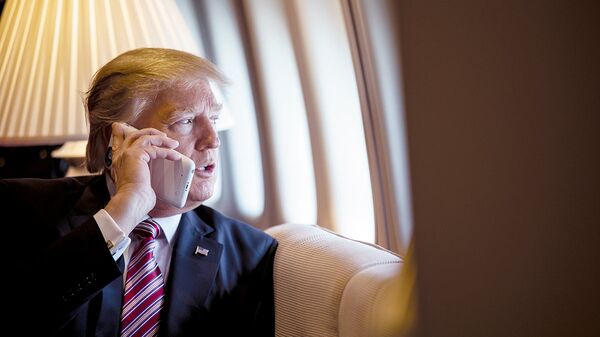The White House has failed to find any record of the alleged phone call between Donald Trump and Gordon Sondland, The Washington Post reports. That phone call emerged in a witness account that the US president said exonerates him from his alleged impeachable offences.
Gordon Sondland, the US ambassador to the EU and long-time Republican donor, testified before Congress that he could recall only one phone conversation with President Trump relating to Ukraine.
He told House investigators in a closed-door deposition last month that the conversation took place on 9 September. He allegedly called Trump to ask him, “What do you want from Ukraine?” to which the president responded, “I want nothing. I want no quid pro quo. Tell Zelensky to do the right thing.”
Trump referred to Sondland’s account when talking to reporters last week, citing it as evidence that he was not seeking favours from Ukraine. He did not confirm the timing of the call himself.
Trump and Sondland might not have talked on 9 September...
But a White House official told The Washington Post that the administration had struggled to find a record of a Trump-Sondland call on 9 September in its switchboard logs.
Another government source said the assumption was that Sondland could not get through to Trump’s personal cell phone – which could explain the apparent absence of logs – because he did not have the number.
The unnamed official said that the ambassador had usually called the White House switchboard if he wanted to speak to the president. Sondland has confirmed himself in public testimony that he could not find any record of the call on 9 September in the records provided by the White House.
According to text messages shared with Congress, Bill Taylor, the top US diplomat in Ukraine, texted Sondland hours before the alleged 9 September call that it was “crazy to withhold security assistance for help with a political campaign.”
...but did days earlier (and that earlier one isn't in Trump's favour)
Witness accounts, however, point to evidence of an earlier call between Trump and Sondland. It was brought up by Bill Taylor, who recalled learning about it from Tim Morrison, the former top Russia and Europe adviser.
Taylor recounted: “On September 7, I had a conversation with Mr. Morrison, in which he described a phone conversation earlier that day between Ambassador Sondland and President Trump. Mr. Morrison said that he had a ‘sinking feeling’ after learning about this conversation from Ambassador Sondland. According to Mr. Morrison, President Trump told Ambassador Sondland that he was not asking for a ‘quid pro quo.’”
In the same testimony, Taylor said that President Trump told Sondland that Ukraine’s President Zelensky should “go to a microphone and say he is opening investigations” into allegations that Joe Biden tried to stopped an investigation into the Ukrainian energy company that employed his son.
“The following day, on September 8, Ambassador Sondland and I spoke on the phone,” Taylor told members of Congress. “He confirmed that he had talked to President Trump as I had suggested a week earlier, but that President Trump was adamant that President Zelensky, himself, had to ‘clear things up and do it in public.’ President Trump said it was not a ‘quid pro quo.’ I believe this was the same conversation between Ambassador Sondland and President Trump that Mr. Morrison had described to me on September 7.”
Taylor, who stepped down from the National Security Council the day before testifying, corroborated that account during his appearance on Capitol Hill on 31 October. He confirmed that the suspension of military aid to Ukraine was linked with Trump’s demand for targeted investigations, or for their announcement, but was adamant this demand wasn’t illegal.
Ambassador Sondland has not publicly disputed Morrison and Taylor’s accounts of the 7 September Trump conversation; neither of them has mentioned a call on 9 September.
How do these calls matter to the impeachment proceedings?
Sondland declined to comment on the discrepancies in those accounts “beyond his descriptions of these matters in his deposition and public testimony.” These discrepancies cast doubt on Donald Trump’s defence that he wanted “no quid pro quo” from Ukraine.
The ambassador last week acknowledged explicitly that there was a quid pro quo regarding the suspension of military aid to Ukraine. He said that by early September, he was still trying to find out why the Ukraine aid was being held back. Morrison testified that Sondland still warned a top aide to Zelensky on 1 September that the Ukrainians “would have to have the prosecutor general make a statement with respect to the investigations as a condition of having the aid lifted.”
The emphasis on the fact that Trump apparently wanted no less than a public announcement from Ukraine, but not just a formal launch of the inquiry, may lead House investigators to conclude that he wanted that investigation to go public specifically to damage Joe Biden’s 2020 campaign. Biden is currently a leading Democratic candidate.
The Democrats believe that this constitutes an abuse of power and, thus, an impeachable offence. However, it will ultimately be up for the senators to decide on whether to impeach the president.


